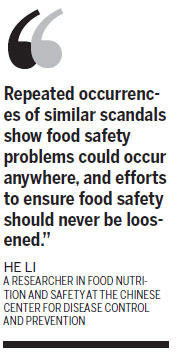Ikea's Chinese meatballs 'free of horsemeat'
Updated: 2013-02-27 10:40
By Wang Xiaodong and Li Fangfang (China Daily)
|
||||||||
However, consumers disappointed to hear they are produced locally
Swedish furniture giant Ikea is insisting its meatballs contain no horsemeat, yet that has not stopped many Chinese customers expressing concerns.
"All the meatballs we sell and serve in China are produced in China. The manufacturer is in Xiamen, Fujian province," Ikea (China) Investment Co said to China Daily by e-mail on Tuesday. "The meatballs only have beef and pork as meat content.
"We do not tolerate any other ingredients than the ones stipulated in our recipes or specifications," the statement said.

The response came after reports that Ikea has withdrawn its meatballs from sale in at least 16 European countries after authorities in the Czech Republic found horsemeat in the product.
According to The Wall Street Journal, Ikea spokeswoman Ylva Magnusson said the company is conducting its own tests on the meatballs and that most Ikea meatballs sold in Europe are produced by a single Swedish supplier.
Many Chinese customers say they were surprised to hear that the meatballs produced in Europe could contain horsemeat and that meatballs served at Ikea restaurants in China were actually produced domestically.
Wu Xia, who regularly eats the meatballs in Beijing, said she has heard about the problems with the meatballs so she did not order any on Tuesday.
"I definitely will not eat meatballs produced by Ikea in the next few days, until the company gives a clear clarification," she said. "It's not that horsemeat is not safe. But I think horses are pets and cannot be eaten."
Jiang Tong, an employee at an IT company in Beijing, said he was surprised to hear the meatballs served at Ikea restaurants were made by Chinese manufacturers.
"I thought the meatballs were imported from Sweden," he said. "I don't think I will order such meatballs in the future."
The horsemeat scandal started in Ireland in mid-January when it was announced that DNA tests on different brands of beef products sold at supermarkets showed traces of horsemeat. More than a dozen nations have detected horsemeat in processed products, and tens of millions of products have been withdrawn.
He Li, a researcher in food nutrition and safety at the Chinese Center for Disease Control and Prevention, said adding horsemeat into products labeled as beef or pork meat is fraud, which misleads consumers who do not want horsemeat and could cause problems in food safety.
"Food safety standards in the European Union are generally the strictest in the world," she said. "Repeated occurrences of similar scandals show food safety problems could occur anywhere, and efforts to ensure food safety should never be loosened."
Contact the writers at wangxiaodong@chinadaily.com.cn and lifangfang@chinadaily.com.cn
Ji Yerong in Beijing contributed to this story.

 'Taken 2' grabs movie box office crown
'Taken 2' grabs movie box office crown
 Rihanna's 'Diamonds' tops UK pop chart
Rihanna's 'Diamonds' tops UK pop chart
 Fans get look at vintage Rolling Stones
Fans get look at vintage Rolling Stones
 Celebrities attend Power of Women event
Celebrities attend Power of Women event
 Ang Lee breaks 'every rule' to make unlikely new Life of Pi film
Ang Lee breaks 'every rule' to make unlikely new Life of Pi film
 Rihanna almost thrown out of nightclub
Rihanna almost thrown out of nightclub
 'Dark Knight' wins weekend box office
'Dark Knight' wins weekend box office
 'Total Recall' stars gather in Beverly Hills
'Total Recall' stars gather in Beverly Hills
Most Viewed
Editor's Picks

|

|

|

|

|

|
Today's Top News
Boston bombing suspect reported cornered on boat
7.0-magnitude quake hits Sichuan
Cross-talk artist helps to spread the word
'Green' awareness levels drop in Beijing
Palace Museum spruces up
First couple on Time's list of most influential
H7N9 flu transmission studied
Trading channels 'need to broaden'
US Weekly

|

|







